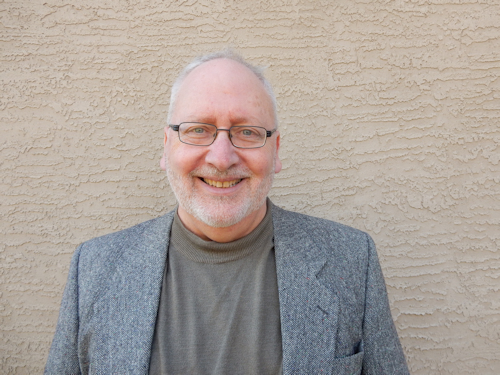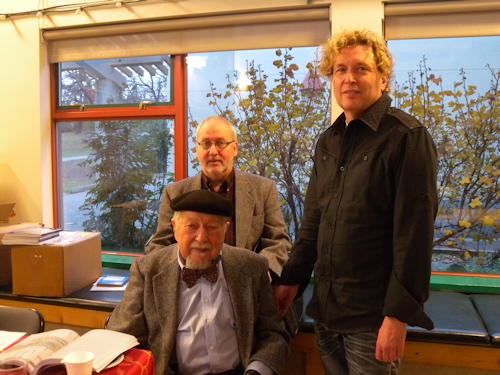Beginning a 50-year Buddhist Journey

This year I celebrate my 50th anniversary of taking faith. My experience is a story of the unlikely meeting, in the world's most beautiful city, of a sick, lonely boy and the greatest philosopher of our time.
I began my practice when I was 13, living in Los Angeles. My oldest brother Pete introduced me during the pioneering phase of the Soka Gakkai movement in North America.
One evening in the mid-1960s, Pete came home with some new friends, who were more cheerful and enthusiastic than our other visitors. Pete's new friends enshrined his Gohonzon and chanted. They told me about Nichiren Buddhism and about Daisaku Ikeda's philosophy of peace. Pete explained the idea that world peace could be achieved through individuals transforming their lives. I was interested in peace because I did not know peace. My family was not happy. My parents fought constantly. It was not a home of love or trust or nurturing. I longed to live in a place of happiness.
Internally also, I was not at peace. I was sick constantly with Crohn's disease. Crohn's is an autoimmune disease making the body treat its digestive system as a foreign object. From Crohn’s I have had extreme pain, ulcers, fistulas, abscesses, malnutrition, arthritis, gangrene, bowel obstructions and sepsis. The cause for Crohn’s is unknown and no cure yet exists.
I started to practise in 1968. In those days, members would go to Japan to deepen their Buddhist faith and understanding, and when they returned they taught me more about Ikeda, his ideas and Nichiren Buddhism. Today we can learn about Ikeda’s thoughts and activities through SGI publications and websites. But in those days, few materials were available in English. For that reason, I wanted to meet him. But I was too young and too sick to go to Japan. The trip cost a great deal of money and I had no money.
Now the unlikely part of my story begins. I heard that Ikeda Sensei (as members often referred to him) was coming to America. I was overjoyed. Finally, I would meet him. Then my father (a university professor) told me he was going on sabbatical. My parents were going to Israel and Europe for a year and I had to go with them.
My joy was immediately crushed. I thought I must be the most unfortunate boy alive. Ikeda was coming to Los Angeles and I would have to leave and be with my quarrelling parents. Many young people would be happy at the idea of not going to school and traveling around the world. Not me.

Keith with his father and brother, Pete
A friend who worked at the organization's centre told me, “Keith, you have to go. You cannot live on your own in L.A. Next April, go to France.” He gave me an address in Sceaux, France, near Paris.I graduated from high school early and flew to meet my parents in Israel. We travelled all over North Africa and Europe. They fought. I was lonely and sick and scared.
Then in April 1972, I left my parents in Geneva and got on a train to Paris. I spoke no French, and did not know anyone. In my pockets were a few U.S. dollars and the address from my friend. It was the headquarters for Soka Gakkai in France. I went and a staff member met me. He asked why I was there. I said I have come from America to meet Ikeda Sensei.
The man replied, “Sensei is not here.”
I said, “That’s okay, I will wait for him.”
I found a tiny room where I could stay in Paris. Most every day I went to this centre in Sceaux. I had very little money and the room took most of what I had. I survived on one loaf of bread a day. I was hungry, lonely and sickly. When I wasn't at the centre I either chanted or wandered the streets of Paris alone. I saw many beautiful things. I loved the museums, parks, monuments, libraries, streets, everything. I was weak but I had a passion inside. Something burned in me.
I met another man at the centre. He was a doctor and the leader of the European organization. He was Dr. Eiichi Yamazaki. He asked why I was there. I said I wanted to meet Ikeda-Sensei. Unlike the first man, the doctor said, “Great! Please help us!” In my stumbling, clumsy way, I tried to help the French members prepare for Sensei's arrival. Likely I was more trouble than help.
April turned to May, and finally Sensei and his wife were coming. Upstairs was a big room to have a meeting. I was directed to a small room downstairs where he would probably not go. After the big meeting, Sensei and Mrs. Ikeda came into the small room where I was chanting. He walked up to me and shook my hand. He looked so happy. I'd never met anyone so happy to be where he was, in the moment. He moved with his wife with incredible grace and beauty, like a beautiful dance.
That is how I came to meet our mentor. Now I will explain why he was there. Up to the present, Daisaku Ikeda has conducted over 1,600 dialogues and written dozens of books with the greatest thinkers of our time. Sensei and those scholars and peace-makers have identified the necessary steps out of the crises humanity faces. They have built a kind of philosophical and practical structure for transforming our planet's destiny.
The first of those dialogues was with the great British historian Arnold Toynbee. Today the SGI engages in many activities, collaborations, and public works for peace. Every activity today for peace, culture, and education grew out of that seminal dialogue with Toynbee. Their discussions have been translated into 28 languages. President Ikeda first met Arnold Toynbee in May of 1972 in London. Before going to London, Sensei and Mrs. Ikeda came to Paris for one week.
At the time I knew none of this. All I knew was he and I were together in this amazing City of Light. I had an entire week of opportunities to see Daisaku Ikeda and his wife. We did gongyo together every day. For one week, I fought with all my might to help him. His secretary assigned me various tasks. People came from all over Europe and Africa to meet him. He and Mrs. Ikeda tirelessly encouraged members and non-members, children and VIPs. Mrs. Ikeda put on a simple, beautiful kimono and they visited the Louvre. One morning after gongyo Sensei patiently taught 200 people how to perform the Japanese tea ceremony. And all the while he quietly prepared for Toynbee.
During that week I made a pledge. I decided that whatever else I did with my life, I would try to help and protect him in his work. I was 17 years old. After that remarkable experience, I returned to Los Angeles. I thought my life would soar. I thought this was how my life would be—helping our mentor in some special way.
That’s not what happened.
My health deteriorated severely. Finally, I had surgery and they removed a huge portion of my intestine. Not for the last time I arrived at the edge of life and death. I was in hospital for over six months. I lost my job and dropped out of university. Lost my girlfriend, lost my car. I got in trouble and was thrown in jail twice. I thought I was so smart; I’d seen so much, done so much. In fact, I knew nothing. I was a mess. Eventually, my parents divorced; I came to Calgary and met the love of my life.
Now life is long and has ups and downs, many twists, turns and detours. The Crohn’s kept returning; the surgeons kept cutting. I have done stupid things and met wonderful, fascinating people. I have seen great beauty and witnessed tremendous ugliness. But not for one day, no matter how down or up I've been; not for one day have I forgotten the pledge I made that spring in Paris. In my stumbling, clumsy way I have tried to be true to that decision.
And very slowly—perhaps slower than necessary—I have built peace inside myself. Determined to change my family’s destiny, I came to love and appreciate Mom and Dad for all I learned from them. As they grew to their final days I tried to honour and support them. Together with my dearest wife and partner in faith, Yoshiko, we have built a harmonious family working toward kosen-rufu and a home where all can come and be refreshed, be encouraged, and find hope. We opened our home and lives to the world and now we operate a guest house. Hundreds of travellers from over 60 countries have stayed with us and found a clean bed, solace, comfort and belonging.
What about the Crohn’s? I have had 11 major surgeries and a lifetime of struggle. Because of my disease I have learned compassion and connection to others. In May of last year, I had an endoscopy. My intestines are perfect—soft and pink and happy. Just like me. Soft and pink and happy. Inside and out, I’ve found some peace.

